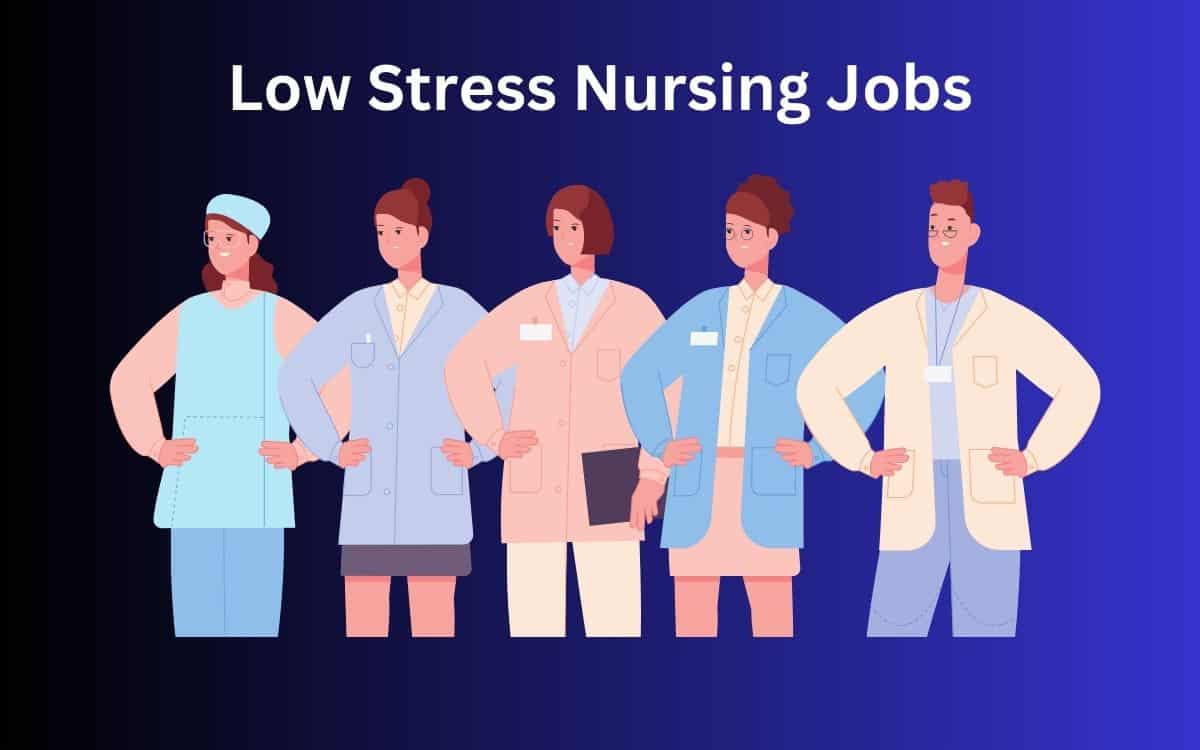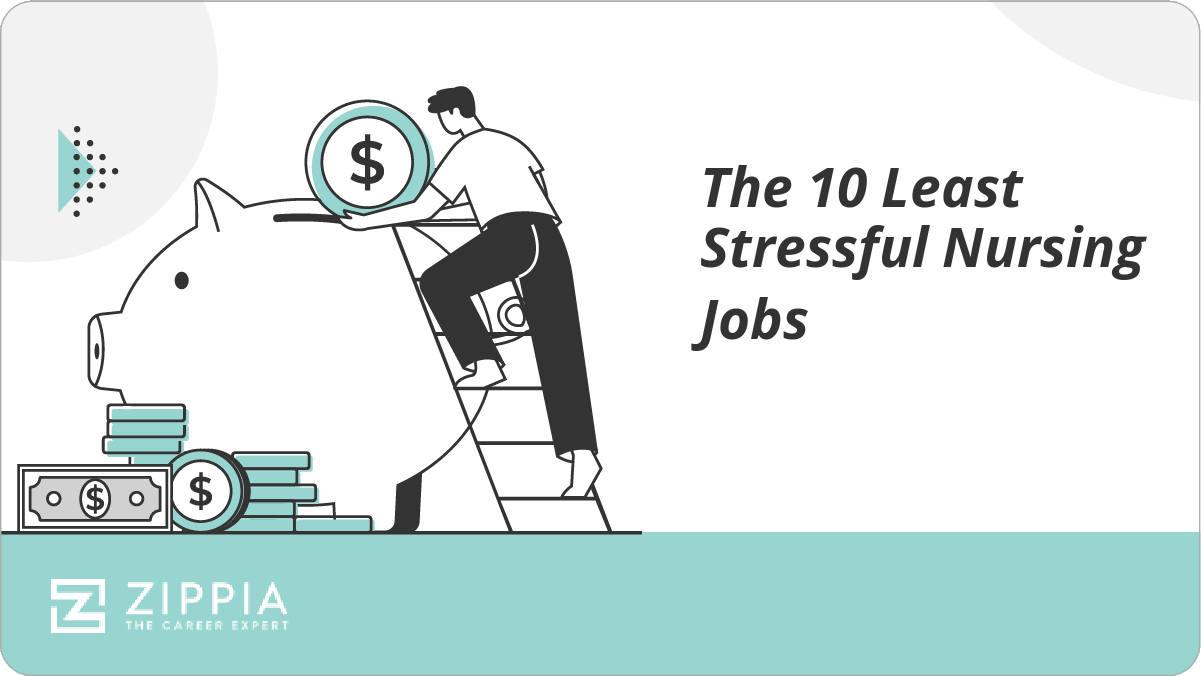10 Least Stressful Nursing Careers Nightingale College

11 Best LowStress Nursing Jobs Inspirationfeed
The most stressful nursing jobs include ICU nurse, ER nurse, and NICU nurse. In these roles, nurses work in an intense environment with high stakes. They manage emergency situations and care for critically ill patients. Other stressful nursing jobs include OR nursing, oncology nursing, and psychiatric nursing.

10+ of the Least Stressful Nursing Jobs You Can Get The Nerdy Nurse
Less stressful finding a job in this field due to its rapid growth as well as the few numbers of nurses currently in the field. Related: 9 Best Remote Nursing Jobs. Cons: Not good for nurses who enjoy spending a lot of time working directly with patients. Some nursing informatics tasks can be repetitive.

TOP 10 LEAST STRESSFUL NURSING JOBS 🐝Nursing Positions to Consider for
Overall, a nursing job that brings no stress is a myth. But certain positions involve fewer high-risk situations and have better-defined schedules, which generally result in less stressful jobs. 1. Nurse Educator. This is one of the least stressful nursing jobs available. While the responsibility of educating the future generations of nurses is.

TOP 5 Least Stressful Nursing Jobs YouTube
Nurse Educator. Average Annual Salary: $77,440. Job Overview: Nurse educators work in faculty positions at nursing schools and teaching hospitals. Educators are registered nurses who have at least.

Exploring the Top 10 Low Stress Nursing Jobs in 2023
Nursing can be demanding, but it doesn't have to be overly stressful. In fact, some nursing positions offer lower-stress environments. This blog post will examine 10 of the least stressful nursing jobs available. We'll explain what each nursing career involves and why it may appeal to those looking for a less stressful nursing role.

The 7 Least Stressful Nursing Jobs Incredible Health
The stress of nursing career paths can have a significant impact on the well-being of nurses, leading to physical and mental health challenges, including burnout, compassion fatigue, and decreased job satisfaction. In a study, 47.8% of the nurses experienced occupational stress. The factors significantly associated with occupational stress.

10 Least Stressful Nursing Careers Nightingale College
3. Nurse Administrator - $86,390. If you're looking for the least stressful nursing jobs, consider the nursing administration career path. While getting into nursing school can be challenging, nursing administrators have the opportunity to pursue leadership positions with autonomy and flexibility.

The 10 Least Stressful Nursing Jobs in 2023 Antigua College International
Nurse Educator. One of the least stressful nursing jobs out there is teaching other nurses. This is a very reliable job with set hours. It doesn't require caring for the critically ill or trying to explain complex medical treatments to family members. Nurse educators work primarily in colleges or universities, teaching nursing students.

The 10 Least Stressful Nursing Jobs (With Salaries) Zippia
In this role, nurses don't have to endure the same stressors as nurses who work directly with patients, and they still experience the satisfaction of making a meaningful impact. According to Salary.com, nurse educators earn an average annual salary of $103,736, but their salary range falls between $86,662 and $115,755.

5 Least Stressful Nursing Jobs in the Healthcare Field
There are nursing jobs with less stress than others. This post will outline various nursing roles that aren't in the emergency room or trauma unit. There are even a host of non-bedside nursing roles that you can perform as well. The positions we will be taking a look at are: Telehealth Nurse. Nurse Educator.

5 Least Stressful Nursing Jobs in the Healthcare Field
5. School Nurse. One of the least stressful nursing jobs available is a school nurse. Becoming a school nurse is a great profession for those individuals who enjoy working with children. One other great benefit of becoming a school nurse is that you enjoy all the benefits of working in an educational facility.

13 Least Stressful Nursing Jobs
Compared to many other nursing roles, hospice nursing operates within a more relaxed setting, significantly reducing stress levels. These nurses make competitive salaries ranging between $67,000 and $91,000 annually, depending on factors such as experience level, qualifications, and location. 8. Public Health Nurse.

10 Least Stressful Nursing Careers Nightingale College
4. Nursing Administrator. If you definitely want to work in a hospital environment, one of the least stressful hospital nursing jobs is a Nurse Administrator. These nurses do not work directly with patients, all but removing that high-stress component associated with many nursing specialties. Nurse Admins can also work outside of hospitals in.

The 10 Least Stressful Nursing Jobs (With Salaries) Zippia
Frequently topping the list of the least stressful nursing jobs are that of nurse educators. Nurse educators are RNs who hold an advanced education degree; however, it is not required in all instances. Typically nurse educators teach in universities but may also work in trade schools and community colleges.

Taking a Closer Look at the (Relatively) Least Stressful Nursing Jobs
Keep in mind that every job has its share of stressful activities. However, nurses consider these careers more relaxing than hospital care. So, let's get started with administrative nursing. 1. Nurse Administrator. Nurse administrators work in the background of healthcare facilities. These experts institute policies, manage hospital systems.

The 7 Least Stressful Nursing Jobs Incredible Health
Some overall, common stressors that are most-often associated with nursing include: Pressure of care-based decisions. Mental fatigue (due to difficult patients or tragic cases) Physical fatigue. High volume of patients seen per shift. "Shared trauma" from patients' severe injuries/illnesses.